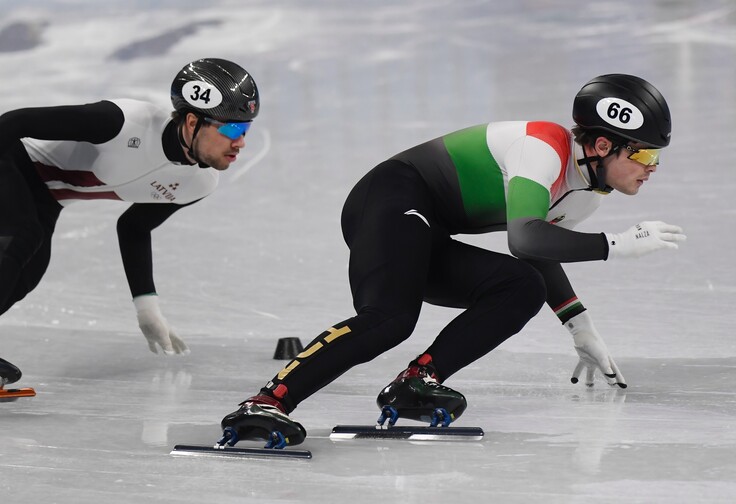The world-famous Olympic historian and President of the International Society of Olympic Historians, David Wallechinsky, travelled to Budapest on the International Olympic Committee's behalf to conduct an interview with 5-time Olympic gold medalist and 5-time World Champion gymnast Ágnes Keleti who is also the world's oldest living Olympic Champion.
He kindly accepted the invitation of the Hungarian Olympic Committee to visit the headquarters, where he was received by President Krisztián Kulcsár and Secretary-General Bálint Vékássy and after an informal meeting with the President, he happily agreed to give us an interview.
Why is the Olympic history so important to you?
When I was a little boy, my father raised me on stories of the Olympics. He, as a young man, had come across Jim Thorpe. He won the pentathlon and decathlon in the 1912 Olympics. I also heard a great deal about Dorando Pietri who collapsed just before the finish line in the 1908 marathon.
When I was 12 years old, my father took me to the Rome Olympics, so I became hooked. When the Olympics were signed to my home town, Los Angeles, I wanted to read a book with the best stories, the statistics and it did not exist. So, I wrote it. It took me two and a half years and, in the end, it became a 1300-page book.
So, I combined my two loves: sports and history.
Which Olympic values are important to you?
There is a deep-rooted set of Olympic values, looking at the writings and speeches of Pierre de Coubertin. People coming together in friendly competition, working together.
In Olympia, Greece, there is a place called the International Olympic Academy. It is the soul of the Olympics. I have seen it over and over again, people coming there and saying „oh I did not know that part of the Olympics." So, I think the Olympic values are really important but overlooked.
What is your take on the direction the Olympics is taking?
Sustainability, fighting for gender equality, reducing the carbon footprint, societal engagement, reduced costs, bridging the differences between nations. North and South Korea coming together was very important. All these are excellent.
What makes a good Olympic historian?
Not having to worry about money. In our society we have 500 volunteers from 60 countries [with several Hungarian members – the editor]. We receive funding from the International Olympic Committee, but basically we volunteer our services.
Like in any aspect of art or history, you need persistence, that love of turning up the unknown fact, the true biography of someone that is truly forgotten. It is like being a collector, a detective. Obviously, there is an aspect to history that has to do with the philosophy and following the development of the Olympic Movement. But in the end, it is about people. Let's just say there are 10,000 people taking part in an Olympic Games. Those are 10,000 stories.
Why did you come to Budapest?
I came here to Budapest to interview Ágnes Keleti who was expelled from the gymnastics club in 1941 for being Jewish.

Ágnes Keleti participating in the ceremonial torch run in Budapest, organized for the 2nd European Games in Minsk, 2019.
She missed her prime because of the war and then in 1948 she was still trying but she got injured in London while training and she did not get to compete in the Olympic Games until she was 31 and then again at 35. That is extraordinary for a gymnast. She came away with 5 gold medals.
I also talked about her life and ordeals during the war with President Krisztián Kulcsár before the interview. She had to buy the identity papers of a Christian and then work as a maid for a pro-Nazi family. She had to gather up dead bodies of the fighting in Budapest in 1944-45 and bring them to the mass graves. She saw a lot before she even got to be in the Olympics.

Do you have a favorite sport or athlete?
I like athletics, track and field, because it is the basic sport. Emil Zátopek winning the 5,000m, the 10,000m and the marathon at the same Olympics. Eric Heiden, the speed skater, won every event from 500m to 10,000m at the same Olympics. How can you do that?
I once interviewed a woman who asked herself after winning a gold medal in alpine skiing, "Is it possible for me to use the skills and values that I learned as an athlete to put it to good use?" So, she became an environmentalist. I admire athletes who make sacrifices to help others and do something with their life outside of sport.
Who would you go to dinner with if it could by anyone?
Funny that you mention it, because my family and I, for years, we did "the book of lists" and one of our chapters was dinner guests. We wrote to famous people from all over the world and asked them the exact same question. We also asked my mother, who would you go with? She picked people who did not speak, so that she could do all the talking. Marcel Marceau, a famous French mime artist, and all these people.
On a more serious note, I am fascinated by human rights; I even wrote a book on present day dictators. But if I could choose one person, I wish I could talk to the Buddha, I like his philosophy.

Also relevant to the question, in my other works I promote what I call everyday heroes. They, on a daily basis, just help somebody. You see an old person crossing the road and you help them. That is good enough for me. Trying to leave the world in a better place than you found it, because small acts of kindness matter.
(HOC, photo: HOC/Péter Szalmás)
